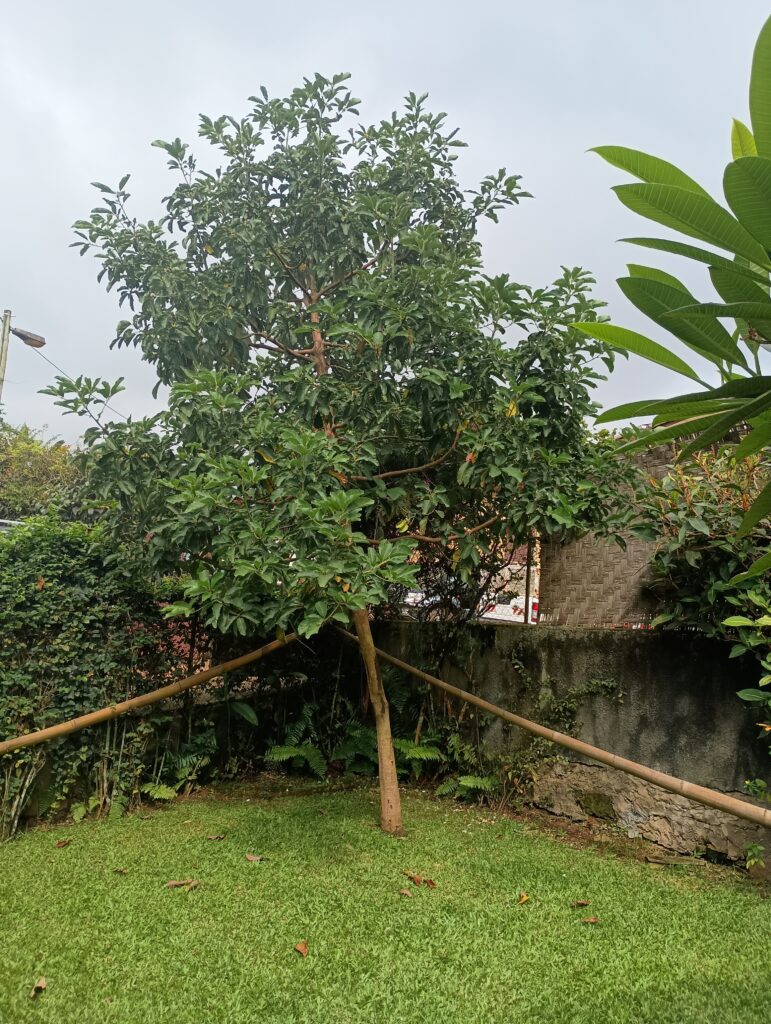
Over four years ago, we planted this avocado tree in our compound in Cameroon. We chose several seeds from a variety we like, sprouted them, then planted them in buckets. Later, we put the most vigorous one in the ground. This October, we caught up with it, and considered a few life lessons we’d like to share: first fruits and the long game, followed by a comparison with Settlers of Catan (and other Engine Building Games), and finally a Where’s Waldo (avocado version).
First Fruits
From our time in Congo, we were familiar with the idea of first fruits on an annual basis. We had mango and avocado trees, and for each one, there was typically a time before the season would begin, where we would get a few pieces of fruit, then nothing, before the season would begin in earnest. I’m not sure if this is what is meant by this verse:
We obligate ourselves to bring the firstfruits of our ground and the firstfruits of all fruit of every tree, year by year, to the house of the Lord;
Nehemiah 10:35 (ESV)
But as we practiced tithing of the fruit of our compound, it was interesting to go without mangoes and avocados for months, then finally get a couple. What do I do with them? Do I enjoy fresh fruit for the first time in months, or do I decide to honor God for his provision, and give these particularly precious fruits to the church? I don’t know that there is one right answer to this question, but it was instructive to think about how much I valued the first fruits of the season, and how to apply the principle King David used :
I will not offer burnt offerings to the LORD my God that cost me nothing.
2 Samuel 24:24 (ESV)
So for some time we have been prepared to think of the spiritual value of God providing good food for us through local trees.
Playing the Long Game
While we knew about firstfruits from Congo, it wasn’t until Cameroon where we started a tree, and got to experience getting nothing from it for years. We got nothing from the tree (that we planted, above) while we lived there, and we saw nothing on it when we returned this October.
When we finally did see one tiny avocado (see below), it seemed like God was giving us an image of our work. While we had done lots of things to provide for the presence and health of the tree, God’s timing for providing fruit was His own:
I planted, Apollos watered, but God gave the growth.
1 Corinthians 3:6 (ESV)
Jesus also connected with the frustration of a man not getting fruit from a tree after multiple years:
And [Jesus] told this parable: “A man had a fig tree planted in his vineyard, and he came seeking fruit on it and found none. And he said to the vinedresser, ‘Look, for three years now I have come seeking fruit on this fig tree, and I find none. Cut it down. Why should it use up the ground?’ And he answered him, ‘Sir, let it alone this year also, until I dig around it and put on manure. Then if it should bear fruit next year, well and good; but if not, you can cut it down.’”
Luke 13:6-9 (ESV)
One might dispute the exact meaning of this parable, but it seems that it at least combines a coming judgment for the unfruitful, on the one hand, and the patient work to bring fruit from them, on the other. The vinedresser knows the difficult necessity of patient, diligent work over the long term, rather than despairing over initial fruitlessness.
I think probably all work of lasting value is like this. Work is done now, but the value of that work isn’t seen now, and maybe not for some time. I think this is definitely true of local church planting, and perhaps even more true of Bible Translation in particular. That is, one can plant a church based on evangelism and discipleship using whatever scripture is available, and some results will come in time. But if we accept the premise that the long-term health of a church depends on a local language Bible, then there is a significant amount of work to do upfront, which may show no fruit whatsoever, for quite some time.
My M.A. work on Maasai felt this way. We were (at one point) criticized and mocked by language speakers for the uselessness of our work, then later they saw some value to it. But it was decades before we heard stories of another linguistics M.A. thesis based on mine, and an elementary school curriculum based (in part) on it, as well. If I’d expected same-day, same-month, or even same-year results, I would have given up.
My time in DRCongo felt this way, as well. I planned for ten years, then was called to start my doctorate after only four. So those four years of planning strategies, building tools, and forming relationships for the long term didn’t end up showing all the results we were hoping for. But my vision for the work has grown through this, and I carry that beginning with me each time my work takes a step up in scope (to a region of Africa, to all Africa, to worldwide writing systems). What A−Z+T is today started in DRCongo, as I was trying to work out how to do some 60 writing systems with myself as the only technical expert, and among people of the materially poorest nation on earth.
So when this happened again after four years in Cameroon, I wonder if it will always feel this way: working to produce long term results, but never having quite enough time to feel fully satisfied with the fruit of that work.
Settlers of Catan (and other Engine Building Games)
Our house likes engine building games (well, some of us, anyway). When we returned for our first furlough and found everyone near our age playing Settlers of Catan, it blew our minds. Since then, we’ve added the other two on this page, but also Wingspan, Steampunk Rally, Ticket to Ride, Seven Wonders, and Pandemic.
It took me years to understand that there are at least two phases in each engine building game:
- building the engine (whatever that looks like in a particular game)
- using it to win (however you do that, in a particular game)
And that using each phase well is critical to victory. For instance, in Catan you build roads, settlements and cities, and collect resources to do other things. Some of these things allow you to do more later, such as new settlements and cities giving you more resources, or new roads allowing you to put a new settlement down. But do more here doesn’t always contribute to your points, which are what make you win the game. So having a long road will allow you to build more settlements or reach a new area, but it will never give you more than two points (assuming you have the longest road) towards victory. So to have any chance to win, you need to not only collect resources, but also use those resources to build things that will give you even more resources. But to win, you need to convert those resources into things that give you points.
Failure to win at an engine building game seems to always come from one of two things:
- Spending too much time building the perfect engine before making it output what you need to win.
- Trying to win too early, before you have enough of an engine built to actually win.
So there seems to be an ideal conversion point, where one switches from building an engine to using it, and finding it is critical to winning one of these games.
In case it isn’t clear where I’m going with this, I feel like my work is like an engine building game. I spend so much time building capacity (as this engine is called in the development world). I want myself and others to do more down the road, because this is a long game. But sometimes I wonder if I spend too much time on that. On the other hand, I feel the temptation to just do something to impress people with fruit now, even if that isn’t the best long-term strategy. I think the answer is to do each at the right time. The rub is that I’m not playing a game that finishes in 45 minutes, which I can do over and over until I understand the rules (and my opponents) well. Rather, I’ve spend the last 23 years building capacity in myself and others to do writing system development for Bible Translation, and I can’t just go back and redo any of that —this game is played exactly once. So we make adjustments as we go, and trust God to make things work out according to His plan.
This probably doesn’t count as an engine building game, but the chicken puzzle has been an old friend as we think through both building capacity and using it. What many people don’t seem to realize is that, either way you do it (there are two solutions), you move the chicken three times as much as you move the fox and the corn. Moving the chicken the first time allows you to move one of the other two safely. Moving the chicken the second time allows you to leave that one alone, to go get the other one. The third time, you actually move the chicken to where it should stay. Anyway, some times we talk about feeling like we’re just “moving the chicken” —doing things that don’t feel productive in themselves, but are necessary to do other things.
Where’s Waldo?
The following pictures will be a Where’s Waldo, avocado version. We were living at this compound some five days before someone pointed out that we actually had an avocado. I had trouble finding it and getting it in a pic, so I’ll share the joy of that experience with you; can you find it?
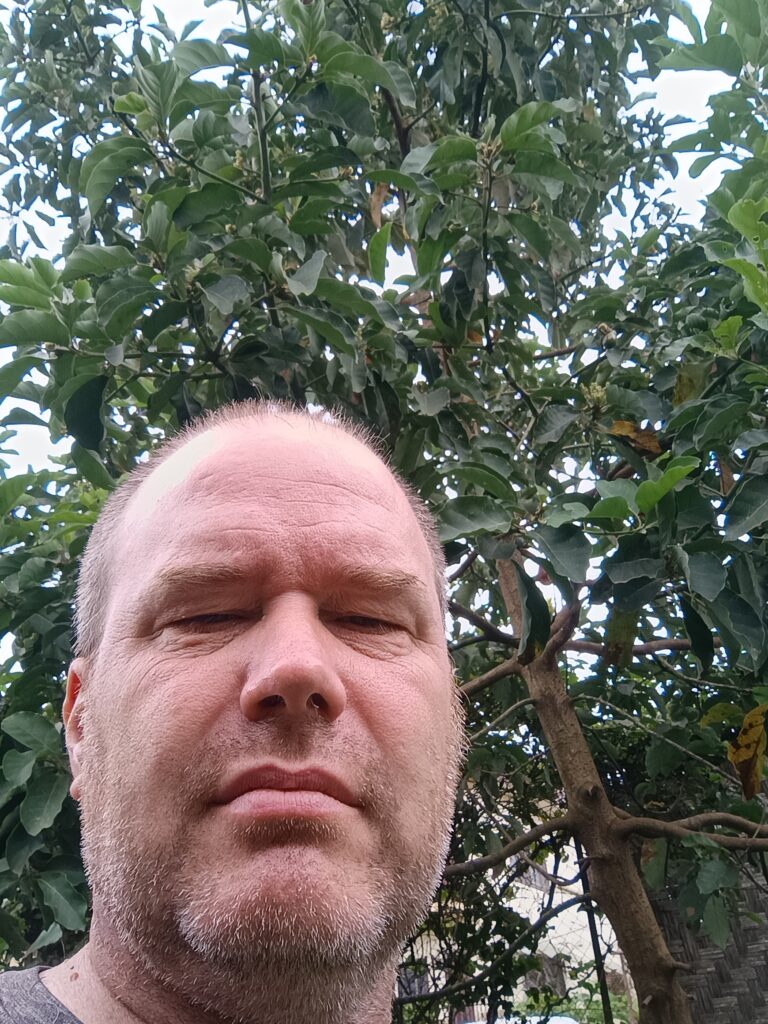
Here it is:
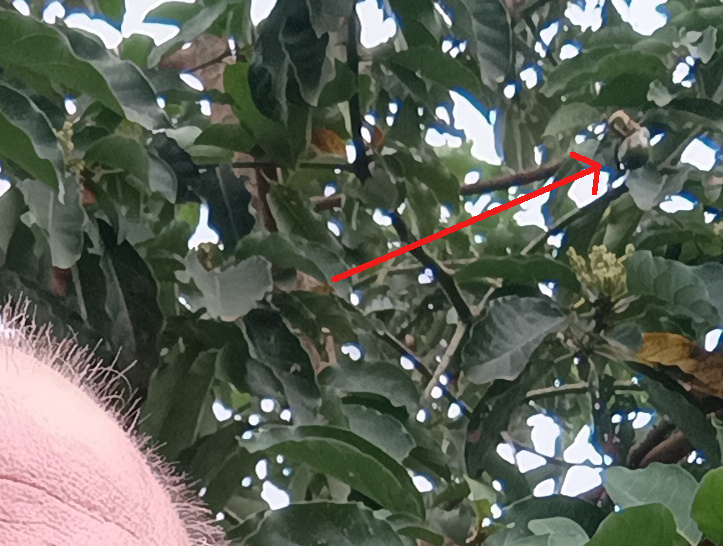
Four days later (the day before we were to leave) I was walking under the tree and found another one, on the other side. I found an angle that allowed both in the same pic; can you find them?
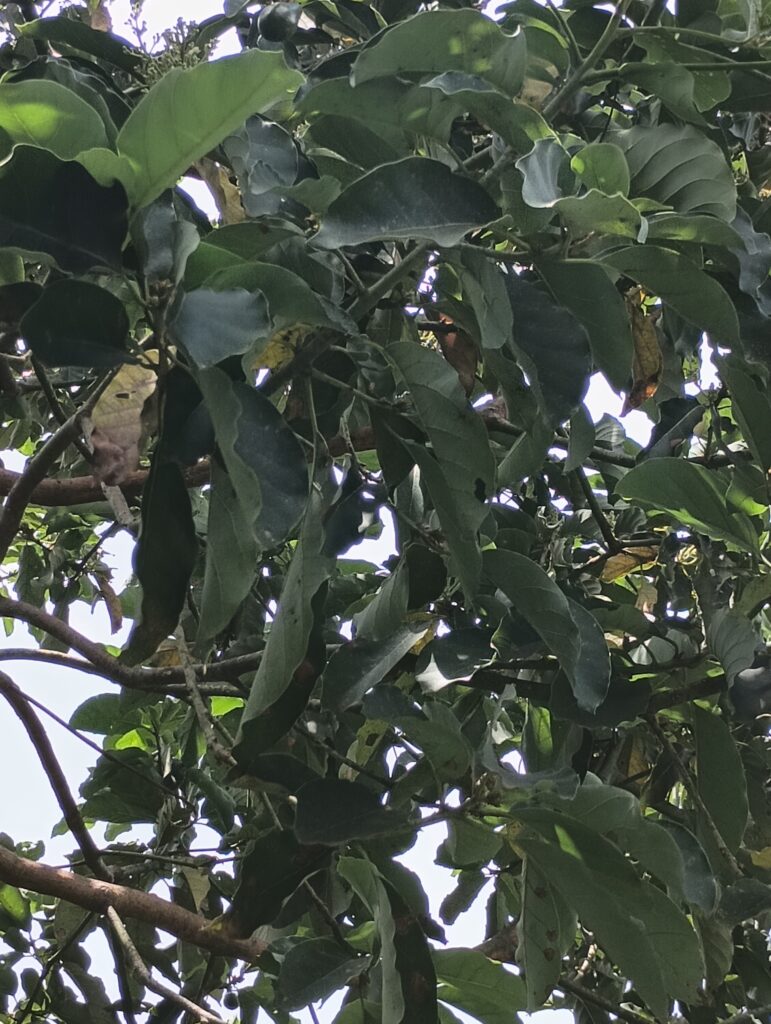
One is in the lower left corner:
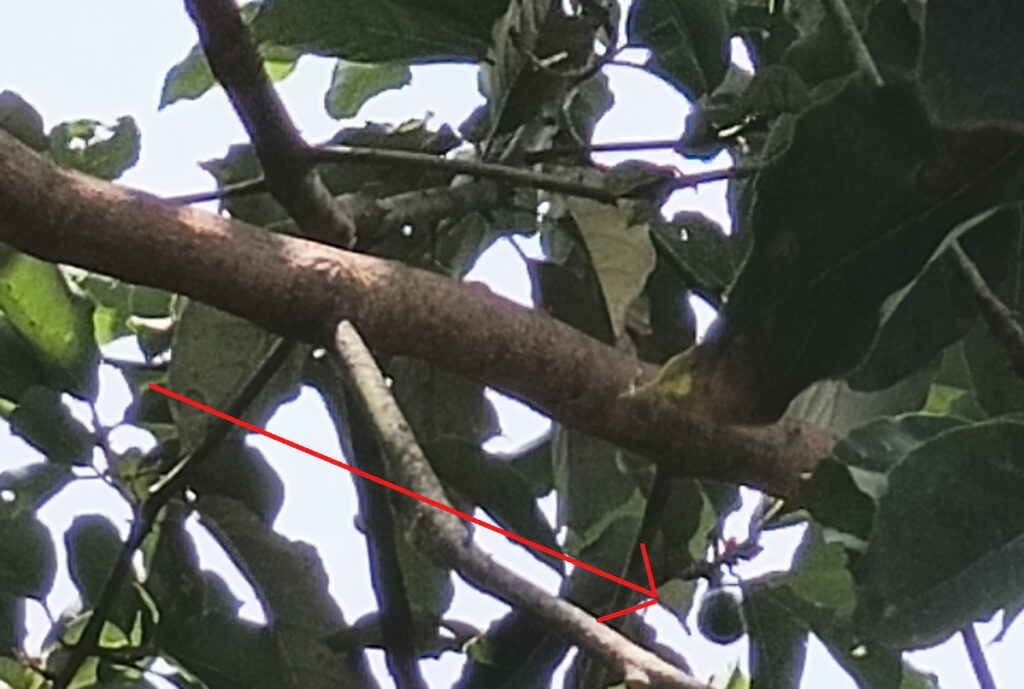
The other is in the upper left corner:
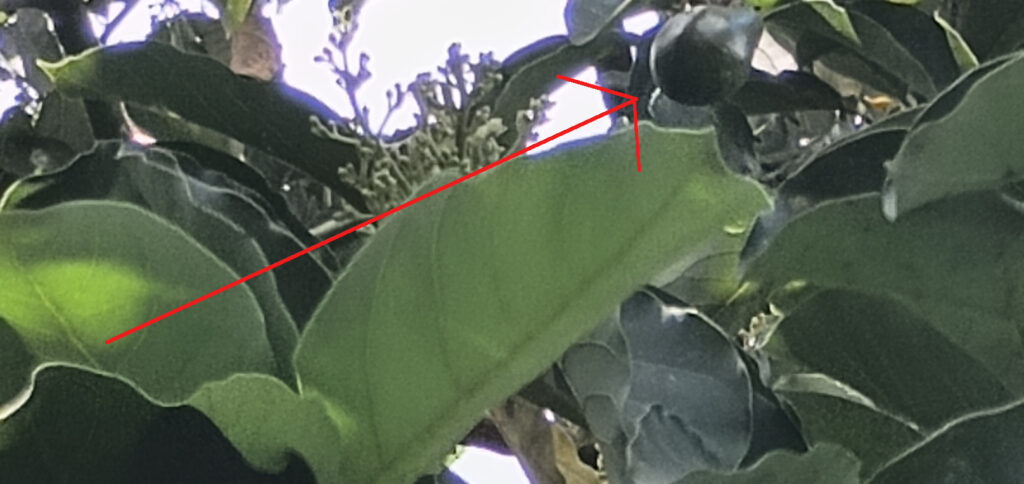
Then, on our last day, I was coming back from our neighbors house, and looking from the other direction, I noticed a third one; can you find it?

It’s just left of my head:
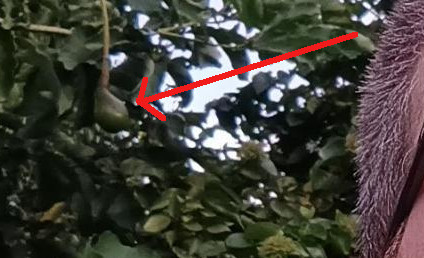
Sometimes building the church can look like hunting around for tiny, almost invisible fruit like this. But God has a plan, and it comes to fruition at the right time —even if not in time for us to eat of it.


0 Comments